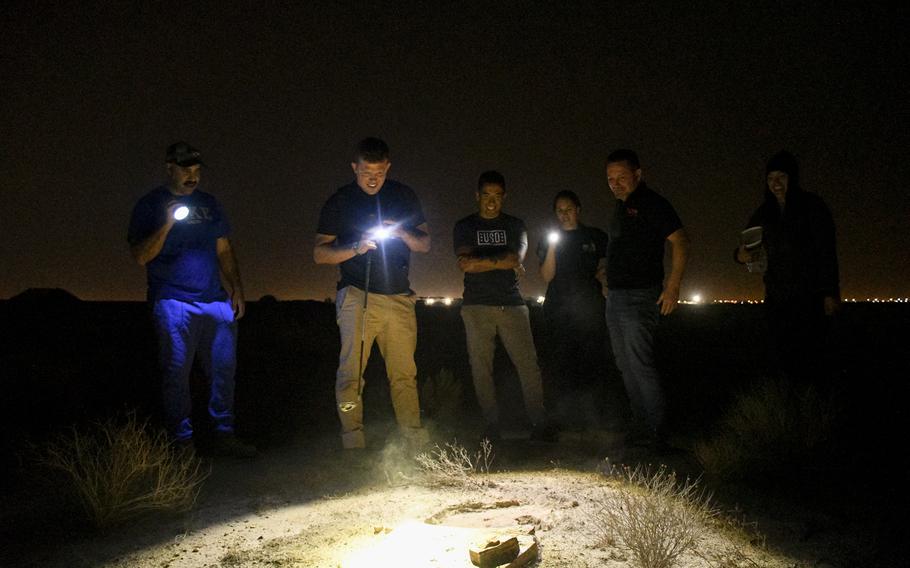
Troops and contractors at Ali Al Salem Air Base in Kuwait gather around a suspected hideout for scorpions while searching for critters on Nov. 28, 2022. (J.P. Lawrence/Stars and Stripes)
ALI AL SALEM AIR BASE, Kuwait — Army veterinary technician Spc. Joseph Neitz shined the ultraviolet beam of his blacklight on the desert sands, yielding a fluorescent turquoise glow that confirmed the presence of his quarry.
The scorpion-hunting former Marine had encountered one of the world’s most dangerous species of the stinging arachnid.
But the Arabian fat-tailed scorpion did not run away. Instead, it raised its pincers and arched its venomous tail at Neitz, as if to challenge him.
Neitz gestured to a fellow hunter, who donned protective gloves, grabbed the tennis-ball-sized critter with metal tongs and placed it in a plastic container.
“Initially we went out to do a population estimate, and then we found that there is a significant number,” said Neitz, who started the scorpion hunts in May.
Troops captured at least 300 of the creatures at the base over those six months, he added. Neitz hopes the military will supply anti-venom to the base after seeing the data.
The base does not have the anti-venom because of a belief that the scorpion population there had diminished over the last five years, he said.
People stationed at Ali Al Salem have gone on some 100 hunts since the spring. The nighttime journeys into the desert attracted hundreds seeking to bag a scorpion or a camel spider during their tour to Kuwait.
So many, in fact, that there’s a waitlist for the hunting parties, said Air Force Staff Sgt. Adan Guzman, a public health technician and fellow leader of the hunts.
During the humid summer months, they’d sometimes find eight or 10 scorpions a night.
“Seeing people catch one for the first time, either they’re super-excited or they’re scared halfway to death,” said Staff Sgt. Brendan Guerra, an Air Force medical equipment technician who’s gone on many of the forays. “Either way, it’s an enjoyable experience.”
“Not many people can say, ‘I went to catch some of the deadliest scorpions in the world in my free time while on deployment,’” Guerra added.
Sometimes the groups didn’t find any scorpions. They were content to watch the top-heavy beetles that strut across the sand, the lines of marching ants or the foxes, lizards, hedgehogs and kangaroo rats that pop out at night from their tunnel networks.
The base provides ample hiding spots for creatures in the abandoned bunkers and aircraft wreckage from when Iraq invaded Kuwait in 1990 under Saddam Hussein.
Guzman said he’s often called to offices and dorms when people discover scorpions. The venom of the Arabian fat-tailed variety is potentially lethal to humans and especially to the military working dogs on the base, he said.
Neitz, who is finishing his deployment, said he hopes the scorpion hunts will continue next year when the weather heats up and the desert’s creatures emerge once again.
He and Guzman cast most of the captured scorpions, and some camel spiders, into a resin memento for the troops who participated in the hunts.
“It’s something different,” he said. “It makes the deployment a little better. And it’s something memorable.”